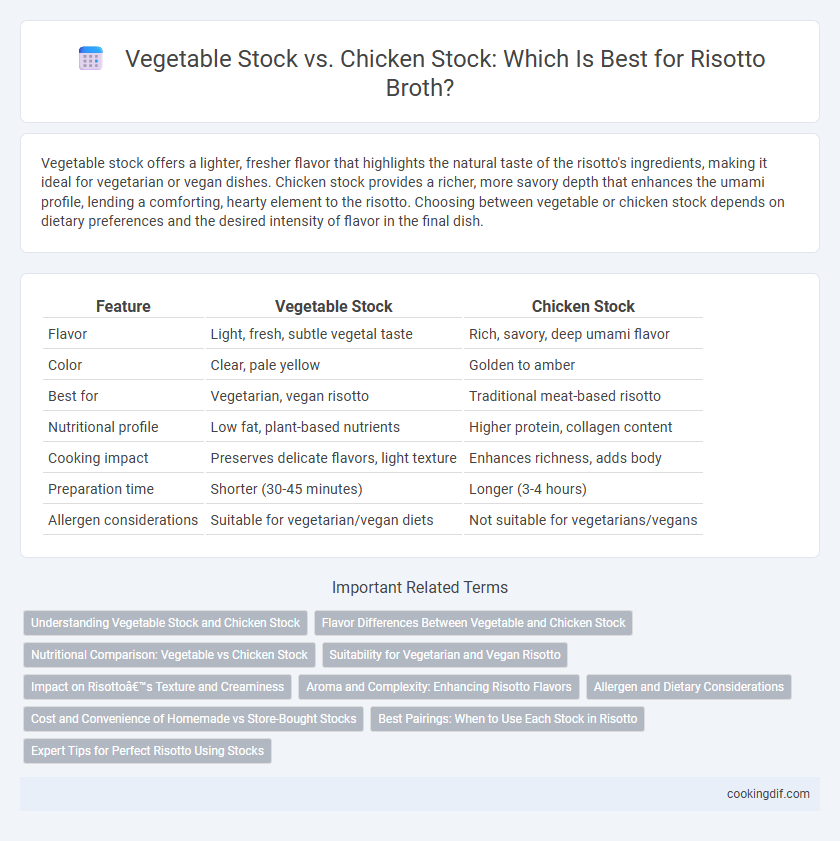Vegetable stock offers a lighter, fresher flavor that highlights the natural taste of the risotto's ingredients, making it ideal for vegetarian or vegan dishes. Chicken stock provides a richer, more savory depth that enhances the umami profile, lending a comforting, hearty element to the risotto. Choosing between vegetable or chicken stock depends on dietary preferences and the desired intensity of flavor in the final dish.
Table of Comparison
| Feature | Vegetable Stock | Chicken Stock |
|---|---|---|
| Flavor | Light, fresh, subtle vegetal taste | Rich, savory, deep umami flavor |
| Color | Clear, pale yellow | Golden to amber |
| Best for | Vegetarian, vegan risotto | Traditional meat-based risotto |
| Nutritional profile | Low fat, plant-based nutrients | Higher protein, collagen content |
| Cooking impact | Preserves delicate flavors, light texture | Enhances richness, adds body |
| Preparation time | Shorter (30-45 minutes) | Longer (3-4 hours) |
| Allergen considerations | Suitable for vegetarian/vegan diets | Not suitable for vegetarians/vegans |
Understanding Vegetable Stock and Chicken Stock
Vegetable stock, made from simmering a mix of vegetables such as carrots, celery, and onions, offers a lighter, more neutral base ideal for vegetarian or delicate risotto recipes. Chicken stock, rich in collagen and fats extracted from chicken bones during long simmering, provides a deeper, more savory flavor that enhances the umami profile and creaminess of the risotto. Choosing between vegetable and chicken stock depends on dietary preferences and desired flavor intensity, with vegetable stock delivering freshness and chicken stock contributing richness and complexity.
Flavor Differences Between Vegetable and Chicken Stock
Vegetable stock delivers a lighter, fresher flavor that highlights earthy and herbal notes, making it ideal for vegetarian risottos or delicate dishes. Chicken stock offers a richer, more robust taste with savory umami qualities that enhance the creamy texture and depth of traditional risottos. Choosing between vegetable and chicken stock significantly influences the final flavor profile, with vegetable stock providing a subtle, clean base and chicken stock adding warmth and complexity.
Nutritional Comparison: Vegetable vs Chicken Stock
Vegetable stock offers a lower-calorie, cholesterol-free option rich in vitamins, minerals, and antioxidants from diverse vegetables, supporting heart health and digestion. Chicken stock provides higher protein content and collagen, promoting joint health and skin elasticity, but contains more sodium and saturated fats. Choosing between them depends on dietary needs, with vegetable stock favoring plant-based nutrition and chicken stock delivering enhanced protein and amino acids.
Suitability for Vegetarian and Vegan Risotto
Vegetable stock is the ideal choice for vegetarian and vegan risotto as it contains no animal products, ensuring the dish remains fully plant-based. Chicken stock, while rich and flavorful, is unsuitable for vegan or vegetarian diets due to its animal origin. Using homemade vegetable stock infused with herbs and vegetables enhances the risotto's depth while maintaining dietary restrictions.
Impact on Risotto’s Texture and Creaminess
Vegetable stock imparts a lighter texture and allows the natural creaminess of Arborio rice to shine in risotto, enhancing subtle vegetable flavors without overwhelming the dish. Chicken stock contributes a richer, more robust flavor profile and slightly thicker mouthfeel due to its higher gelatin content, which can intensify the risotto's creaminess and depth. The choice between the two stocks significantly affects the risotto's final texture and flavor balance, making vegetable stock ideal for lighter, delicate preparations and chicken stock preferable for heartier, more savory variations.
Aroma and Complexity: Enhancing Risotto Flavors
Vegetable stock imparts a light, fresh aroma with subtle herbal notes that enhance the natural flavors of vegetables in risotto, creating a delicate complexity ideal for vegetarian dishes. Chicken stock offers a richer, deeper aroma with savory umami elements, adding robust complexity that enriches the overall flavor profile of the risotto. Choosing between these broths depends on desired flavor intensity, with vegetable stock promoting brightness and chicken stock delivering warmth and depth.
Allergen and Dietary Considerations
Vegetable stock is a preferred choice for risotto when accommodating common allergens and dietary restrictions such as gluten intolerance, dairy allergies, and vegetarian or vegan diets. Chicken stock, while rich in flavor, contains animal proteins that may trigger allergies or exclude those on plant-based or kosher diets. Selecting vegetable stock ensures a safer, inclusive culinary option without compromising the broth's savory depth.
Cost and Convenience of Homemade vs Store-Bought Stocks
Vegetable stock offers a cost-effective and convenient option for risotto, especially when using homemade broth made from leftover vegetable scraps, reducing waste and expense. Chicken stock, though richer in flavor, often requires more time and resources to prepare at home, making store-bought varieties a practical alternative despite higher costs. Store-bought vegetable stock typically provides the fastest convenience with moderate pricing, while homemade chicken stock demands longer preparation but can enhance risotto with deeper umami notes.
Best Pairings: When to Use Each Stock in Risotto
Vegetable stock enhances the subtle, fresh flavors of a vegetable or mushroom risotto, providing a light, aromatic base that complements delicate ingredients without overpowering them. Chicken stock offers a richer, more robust taste, ideal for meat or seafood risottos, as it adds depth and umami that intensify the overall flavor profile. Choosing between vegetable and chicken stock depends on the desired intensity and compatibility with the risotto's primary ingredients.
Expert Tips for Perfect Risotto Using Stocks
Vegetable stock enhances risotto with subtle, fresh flavors ideal for vegetarian or light dishes, while chicken stock provides a richer, more savory depth suited for hearty recipes. Experts recommend using homemade stocks to control salt levels and intensify natural aromas, elevating the overall texture and taste of the risotto. Balancing the broth temperature and gradually adding it ensures creamy consistency and optimal absorption of flavors.
Vegetable stock vs Chicken stock for broth Infographic

 cookingdif.com
cookingdif.com